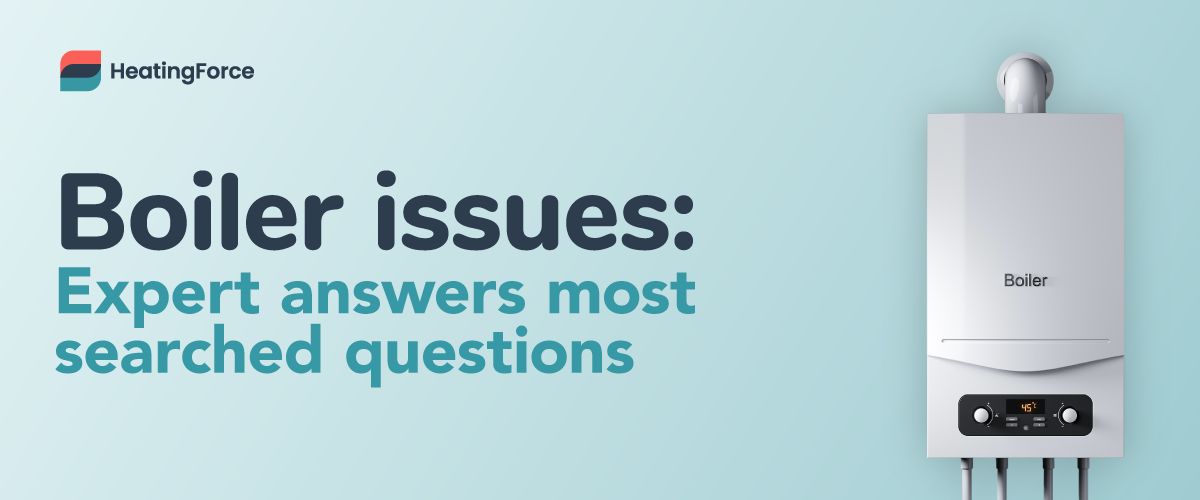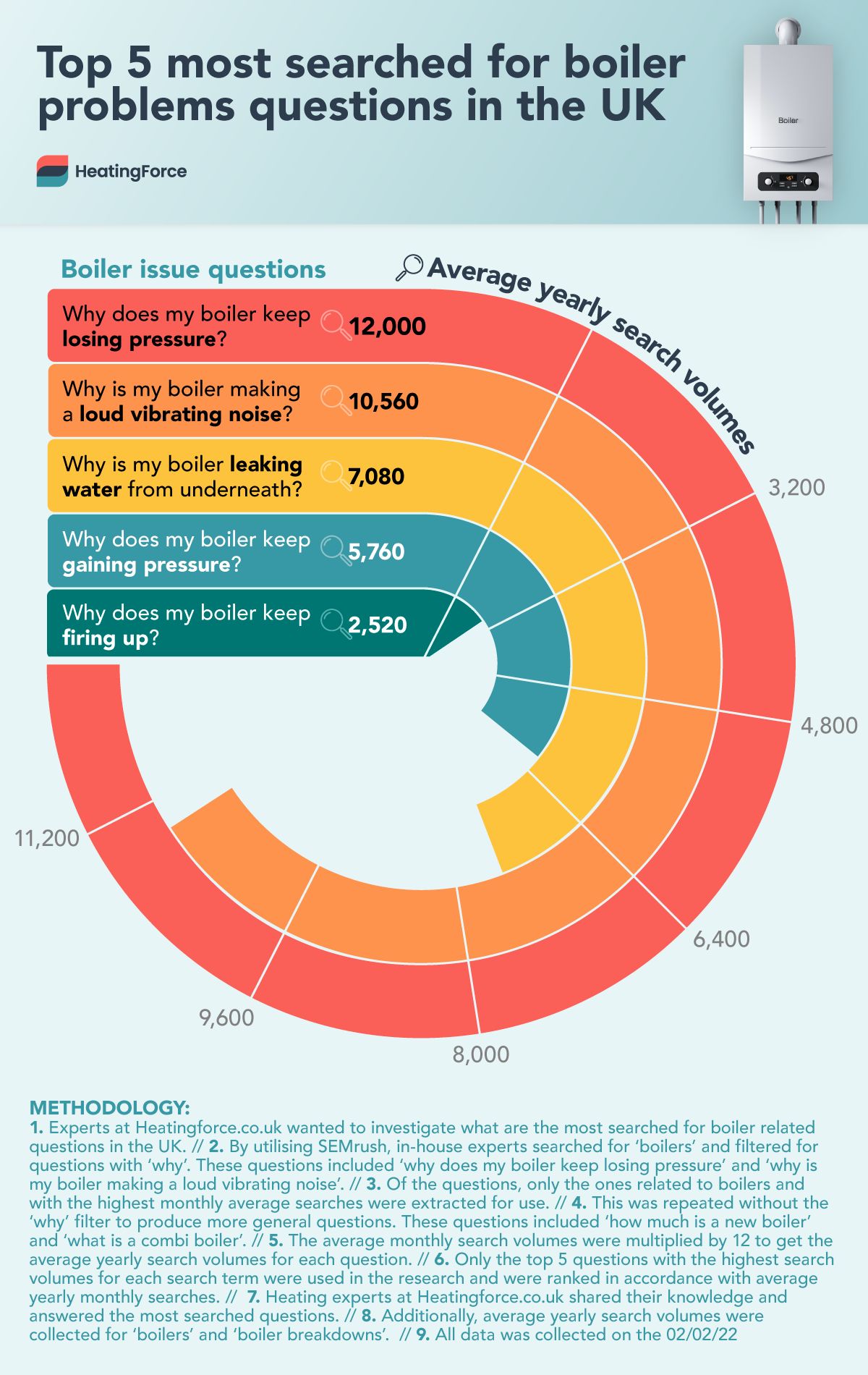Boiler Issues: Expert Answers Most Searched Questions in the UK
From leaks to radiator faults, boilers can suffer from a wide range of problems if not serviced regularly.
Boiler issues can cause chaos, particularly during the winter months. And with Ofgem confirming that energy bills will increase by hundreds of pounds a year for millions of households, this has created increased anxiety across the UK.

With that in mind, experts at HeatingForce used SEMrush to discover which boiler issue questions had the highest yearly average searches, then widened the search to find out which general boiler-related questions had the highest search volumes.
Top 5 Most Searched For Boiler Problems Questions in the UK
Let’s take a look at the results and the expert’s responses below.

| Boiler Issue Questions | Average Yearly Search Volumes | |
| 1 | Why does my boiler keep losing pressure | 12,000 |
| 2 | Why is my boiler making a loud vibrating noise | 10,560 |
| 3 | Why is my boiler leaking water from underneath | 7,080 |
| 4 | Why does my boiler keep gaining pressure | 5,760 |
| 5 | Why does my boiler keep firing up | 2,520 |
#1 – Why does my boiler keep losing pressure?
The most searched question with the highest yearly search volume of 12,000, was ‘why does my boiler keep losing pressure.’
Loss of pressure is one of the most common boiler problems, and actual pressure loss is always caused by a leak – not necessarily a leak in the boiler itself, which is possible, but a leak anywhere in the central heating system. This could be the radiators, pipework, or the boiler’s internal components.
The fix? While topping up the heating system with water may seem like a simple fix , it’s not a permanent solution, because the boiler will continue to lose pressure as long as the leak exists. To keep the boiler from losing pressure, you’ll need to find the leak and fix it. Then, you can top up the boiler via the filling loop, and it should function without further pressure problems. Find out more in our in-depth guide on boilers losing pressure.
#2 – Why is my boiler making a loud vibrating noise?
The second most searched boiler issue question was ‘why is my boiler making a loud vibrating noise,’ and this had a result of 10,560.
If a boiler is making a loud vibrating noise, it’s most likely the case that one of its motorised components has seized. It could be the pump, but to make sure, check if the pump is hot to the touch. If it’s uncomfortably hot, whilst the boiler makes a loud vibrating noise, you can safely assume that the pump is stuck.
To resolve this, you’ll need to make sure the boiler pump is clean, and the best course of action is to get a Gas Safe engineer to inspect the boiler. If the pump has seized because of limescale or sludge buildup, the engineer will thoroughly clean it, and may also recommend that you flush out the entire central heating system.
Failure to do this can lead to debris clogging up other parts, preventing them from functioning efficiently. If the pump is faulty due to wear and tear, you may have to replace it with a new one.
Also, note that boiler pumps make humming noises, vibrating slightly as they function. So it’s important to check that the sound isn’t just its normal operating noise level.
#3 – Why is my boiler leaking water from underneath?
Next on the most searched boiler issue questions list was ‘why is my boiler leaking water from underneath.’ This question had a result of 7,080. It’s likely that this could occur when there’s a leak in one of the internal components, such as:
Pressure Release Valve
A pressure release valve helps the boiler get rid of excess water when its pressure climbs above the threshold. So, there’s always the possibility that the boiler’s pressure is too high, and the PRV is simply doing its job and discharging water from the system to lower it.
Start by finding out why the boiler pressure is too high. This could be due to an overfilled central heating system or a filling loop valve that isn’t closed correctly. Alternatively, the PRV itself may be defective. In either case, it’s advisable to hire a Gas Safe engineer to examine the fault and offer the best solution.
Boiler pump
Boiler pumps typically deteriorate over time, as their seals get worn out. These blown seals are the most common root cause behind a leaky boiler pump. Consistently high boiler pressure can also cause the pump seals to fail. If the boiler pump is leaking, you’ll need to either repair or replace the pump to eliminate the leak.
Pipes and joints
It’s possible that the pipes and joints leading to the boiler have corroded, cracked, or developed leaks due to poor installation. A simple visual investigation should suffice. If you can confirm that this is the problem, ask a Gas Safe engineer to come by and fix or replace the damaged parts.
#4 – Why does my boiler keep gaining pressure?
Also in the top five most searched questions was ‘why does my boiler keep gaining pressure’ – this question had a search volume of 5,760. Possible reasons for this scenario include:
Too much water in the system
If you’ve recently topped up the central heating system with water, you may have overfilled it. This excess water causes the boiler pressure to rise above its working threshold as it heats. To resolve this, you’ll have to drain your central heating system to a point where the boiler pressure returns to normal.
Filling loop letting water in
If you refilled the central heating system via the filling loop, you might not have completely turned off the filling loop. This means that there is a constant trickle of water making its way into the central heating system, causing the boiler pressure to surge. A heating engineer should be able to rectify the problem; don’t attempt to do this, as you may need to disconnect the filling loop.
#5 – Why does my boiler keep firing up?
With a search volume of 2,520, the fifth most searched question about boiler problems was ‘why does my boiler keep firing up.’ If a boiler keeps firing up then shutting down, there’s probably an issue with the gas supply. The three most common issues linked to this are:
- the gas valve may be stuck and not letting through an adequate volume of gas to keep the boiler working properly;
- gas meter problems which prevent a sufficient volume of gas from keeping the boiler running;
- and finally, a carbon build-up on the burner, causing an intermittent gas flow. In this case the boiler turns on and off.
Regardless of the underlying problem, you should never attempt to fix gas supply issues independently. Always consult with a Gas Safe engineer instead.
Top 5 Most Searched For General Boiler Questions UK
| General Question For Boilers | Average Yearly Search Volumes | |
| 1 | How much is a new boiler | 52,800 |
| 2 | What is a combi boiler | 43,200 |
| 3 | How much is a boiler service | 34,800 |
| 4 | How to repressurise a boiler | 28,800 |
| 5 | Who qualifies for a boiler grant | 22,800 |
As we’ve shown above, with some tweaks and regular servicing, your boiler can function well for a very long time – anywhere between 10 to 15 years actually!
However, there’s a common misconception that old boilers are inefficient and need to be replaced – the results for general boiler questions showed that the highest search volume of 52,800, was for the question ‘how much is a new boiler?’ and so revealing that most peoples’ concerns are about the cost of replacing a boiler.
Of course, some boiler issues will require far more than some tweaks, with the only solution being ‘out with the old and in with the new.’
The second most searched question was ‘what is a combi boiler,’ which had a very high result of 43,200. Combi is short for combination boiler, and is called this because it provides both hot water and heating from a single unit – an advantage over old heating systems that featured an immersion heater, fed with water from a header tank in the attic. As combi boilers are compact, they’re also well suited to homes with less space.
Other questions among the top five highly searched boiler questions included ‘how much is a boiler service (34,800), and ‘how to repressurise a boiler’ with a result of 28,800.
Another highly searched question was ‘who qualifies for a boiler grant’ which had a search volume of 22,800. The UK government runs the Energy Company Obligation (ECO) programme, in its efforts to reduce fuel poverty and carbon emissions by funding initiatives like free boiler grants. Being eligible for a boiler grant depends on certain criteria, such as:
- The existing boiler must be at least 8 years old.
- Only the owner of the property can apply for the grant – not the council or privately rented properties.
- The property must be connected to the mains gas supply. This means that boilers running on fuel sources like oil or LPG gas aren’t included.
- The applicant must receive at least one of the government’s list of benefits, for example, income-based job seekers allowance or disability living allowance.
Your energy supplier should let you know If you’re eligible for a boiler grant. If you haven’t been contacted but believe that you’re eligible, enquire about the scheme with your supplier.
Tips to keep your boiler in good condition
So, with your most burning questions answered, you need to be prepared for the severe challenges winter brings to your heating system, and here are some tips for keeping your boiler healthy.
1. Get your boiler serviced annually
Boilers should be serviced annually by a qualified Gas Safe engineer. The engineer would also get a chance to spot any issues that could arise and fix them before they prevent your boiler from functioning. A good hack is to book your service before the winter months (when you’ll need your heating most) to get any underlying issues resolved.
2. Checking your boiler pressure
If your pressure is too low or too high, your boiler needs some help. Check the pressure gauge, which is usually located on the front of the boiler unit. It should rest around the 1.5 bar. If it’s below this, it will need repressurising and if it’s above, your radiators might need bleeding.
3. Bleed your radiators
To protect your property from heating problems, remember to bleed radiators regularly – it’s good to do this at least once a year. And it’s simple! It just involves opening a valve on your radiators and letting out the trapped air preventing them from heating up properly.
4. Insulate the pipes
In the winter, your pipes are at risk of freezing and potentially bursting. Heat retention is key, and by insulating any exposed pipes, you’ll be able to maximise heat retention in the system, helping it to run more efficiently and preventing the pipes from freezing in very cold temperatures. Lagging or the protective layer can be bought from most hardware stores.
5. Turn your heating on before you need it
Most of us don’t think about switching our boiler on during summer and autumn. But what we don’t want to find is any unwanted surprises when it’s winter and our boiler has packed in. So, it’s good to briefly switch your boiler on at least twice a month, even in the summer, to make sure all its parts are working correctly. It will give you the chance to detect any problems early, long before the winter freeze kicks in.
Summing up on boiler issues
As shown by an extremely high monthly search volume of 40,500, your ‘boiler’ is one of the most important appliances to be found in your home, playing a vital part in keeping your home life running smoothly by providing a warm, comfortable environment and hot water. So, make sure your boiler is always ready to heat up your home by keeping it well maintained and protected all year round.
Methodology
- Experts at Heatingforce.co.uk wanted to investigate what are the most searched for boiler-related questions in the UK.
- By utilisingSEMrush, in-house experts searched for ‘boilers’ and filtered for questions with ‘why’. These questions included ‘why does my boiler keep losing pressure’ and ‘why is my boiler making a loud vibrating noise’.
- Of the questions, only the ones related to boilers and with the highest monthly average searches were extracted for use.
- This was repeated without the ‘why’ filter to produce more general questions. These questions included ‘how much is a new boiler’ and ‘what is a combi boiler’.
- The average monthly search volumes were multiplied by 12 to get the average yearly search volumes for each question.
- Only the top 5 questions with the highest search volumes for each search term were used in the research and were ranked in accordance with average yearly monthly searches.
- Heating experts at Heatingforce.co.uk shared their knowledge and answered the most searched questions.
- Additionally, average yearly search volumes were collected for ‘boilers’ and ‘boiler breakdowns’.
- All data was collected on 02/02/22
